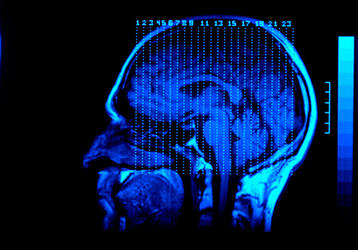Brain scans might predict recovery potential for vegetative patients
Thinkstock


A free daily email with the biggest news stories of the day – and the best features from TheWeek.com
You are now subscribed
Your newsletter sign-up was successful
Researchers have found that scans that look for signs of metabolic activity in specific areas of the brain could help doctors predict whether a person in a vegetative state will regain consciousness.
The findings were published Tuesday in the journal The Lancet. Researchers in Belgium tracked about 120 subjects — diagnosed as either minimally conscious, locked in, or unresponsively wakeful (vegetative) — for at least one year. When images of the brain were taken with a positron emission tomography (PET) scan, the researchers accurately predicted 74 percent of the time if a patient would show signs of consciousness a year later, and 92 percent of the time if they would remain in a vegetative or minimally conscious state.
In the 41 patients deemed in a vegetative state using normal tests, the PET scan found previously undetected minimal consciousness in 13. A year later, nine of the 13 had progressed into at least a minimally conscious state, three had died, and one was still in a vegetative state.
The Week
Escape your echo chamber. Get the facts behind the news, plus analysis from multiple perspectives.

Sign up for The Week's Free Newsletters
From our morning news briefing to a weekly Good News Newsletter, get the best of The Week delivered directly to your inbox.
From our morning news briefing to a weekly Good News Newsletter, get the best of The Week delivered directly to your inbox.
The metabolic patterns of a brain in a vegetative state look different from those of a brain with intermittent consciousness, the researchers found. The prognosis was best for those who had survived traumatic brain injury, as opposed to someone whose brain was damaged due to hypoxia, a prolonged interruption of oxygenated blood to the brain.
The findings show that PET scans paint a clearer picture of the patient's outcome than the more widely available functional magnetic resonance imaging, or fMRI. The difference between the two is that PET scans detect signs of metabolic activity, while an fMRI detects activity in certain brain regions by looking for oxygenation.
The new research could provide hope, or at least guidance, for the families of vegetative patients. But not all patients with hopeful PET scans will recover. "We shouldn't give these families false hope," report author Steven Laureys tells The New York Times. "This is very difficult. But it's just a very complex medical reality. Quantifying consciousness is tricky."
A free daily email with the biggest news stories of the day – and the best features from TheWeek.com
Catherine Garcia has worked as a senior writer at The Week since 2014. Her writing and reporting have appeared in Entertainment Weekly, The New York Times, Wirecutter, NBC News and "The Book of Jezebel," among others. She's a graduate of the University of Redlands and the Columbia University Graduate School of Journalism.
-
 5 cinematic cartoons about Bezos betting big on 'Melania'
5 cinematic cartoons about Bezos betting big on 'Melania'Cartoons Artists take on a girlboss, a fetching newspaper, and more
-
 The fall of the generals: China’s military purge
The fall of the generals: China’s military purgeIn the Spotlight Xi Jinping’s extraordinary removal of senior general proves that no-one is safe from anti-corruption drive that has investigated millions
-
 Why the Gorton and Denton by-election is a ‘Frankenstein’s monster’
Why the Gorton and Denton by-election is a ‘Frankenstein’s monster’Talking Point Reform and the Greens have the Labour seat in their sights, but the constituency’s complex demographics make messaging tricky
-
 Blue Origin launches Mars probes in NASA debut
Blue Origin launches Mars probes in NASA debutSpeed Read The New Glenn rocket is carrying small twin spacecraft toward Mars as part of NASA’s Escapade mission
-
 Dinosaurs were thriving before asteroid, study finds
Dinosaurs were thriving before asteroid, study findsSpeed Read The dinosaurs would not have gone extinct if not for the asteroid
-
 SpaceX breaks Starship losing streak in 10th test
SpaceX breaks Starship losing streak in 10th testspeed read The Starship rocket's test flight was largely successful, deploying eight dummy satellites during its hour in space
-
 Rabbits with 'horns' sighted across Colorado
Rabbits with 'horns' sighted across Coloradospeed read These creatures are infected with the 'mostly harmless' Shope papilloma virus
-
 Lithium shows promise in Alzheimer's study
Lithium shows promise in Alzheimer's studySpeed Read Potential new treatments could use small amounts of the common metal
-
 Scientists discover cause of massive sea star die-off
Scientists discover cause of massive sea star die-offSpeed Read A bacteria related to cholera has been found responsible for the deaths of more than 5 billion sea stars
-
 'Thriving' ecosystem found 30,000 feet undersea
'Thriving' ecosystem found 30,000 feet underseaSpeed Read Researchers discovered communities of creatures living in frigid, pitch-black waters under high pressure
-
 New York plans first nuclear plant in 36 years
New York plans first nuclear plant in 36 yearsSpeed Read The plant, to be constructed somewhere in upstate New York, will produce enough energy to power a million homes
